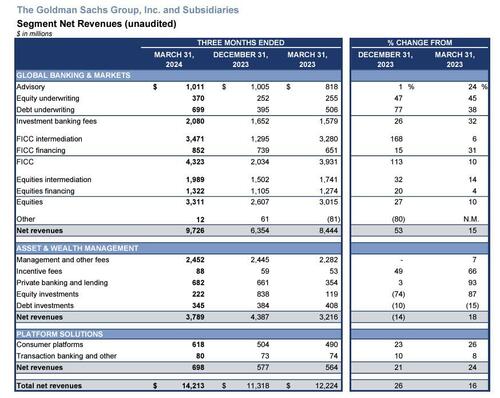International
Goldman Soars On “Near-Perfect” Top To Bottom Beat As Solomon Sees Rebound In Dealmaking
Goldman Soars On "Near-Perfect" Top To Bottom Beat As Solomon Sees Rebound In Dealmaking
With JPMorgan tumbling on Friday on a net interest…

With JPMorgan tumbling on Friday on a net interest income miss and disappointing guidance, suffering its worst earnings-day slump in decades, financials needed a solid report this morning and got it from the bank that once was the envy of all its Wall Street peers before a series of catastrophic decisions saw it lose most of its vaunted trading floor amid a disastrous foray into consumer subprime lending. Yes, the Goldman Sachs formerly known as the Vampire Squid, is soaring this morning after reporting stellar Q1 results that beat across the board and saw profit surge 28% in Q1 - even as analysts expected a decline from a year ago - driven by strong performance in its marquee trading business as well as a resurgence in underwriting and dealmaking.
Here's what Goldman reported for the first quarter:
- Net revenue $14.21 billion, +16% y/y, beating est. $12.98 billion
- FICC sales & trading revenue $4.32 billion, +10% y/y, beating estimates of $3.64 billion
- Global Banking & Markets net revenues $9.73 billion, +15% y/y, beating estimates of $8.46 billion
- Investment banking revenue $2.09 billion, beating estimates of $1.82 billion
- Equities sales & trading revenue $3.31 billion, +9.8% y/y, beating estimates of $2.96 billion
- Advisory revenue $1.01 billion, +24% y/y, beating estimates of $874.4 million
- Equity underwriting rev. $370 million, +45% y/y, beating estimates of $331.4 million
- Debt underwriting rev. $699 million, +38% y/y, beating estimates of $611.1 million
Looking below the line we find more of the same:
- Net Income $4.1BN, up 28% from $3.2BN a year earlier and beating estimates by almost $1BN
- EPS $11.58, beating est of 8.56, and up 32 vs. $8.79
And visually:
Some more details:
- Net interest income $1.61 billion, -9.7% y/y, beating estimates of $1.47 billion
- Platform Solutions pretax loss $117 million, estimate loss $260.5 million
- Total deposits $441 billion, +3% q/q
- Loans $184 billion, +3.4% y/y, estimate $185.39 billion
- Provision for credit losses $318 million vs. recovery $171 million y/y, below the estimate $503.4 million
- Total operating expenses $8.66 billion, +3% y/y, higher than the estimate $8.47 billion
- Compensation expenses $4.59 billion, +12% y/y, higher than the estimate $4.29 billion
- Assets under management $2.85 trillion, +6.6% y/y, estimate $2.92 trillion
- Total AUS net outflows $15 billion vs. inflows $57 billion y/y, estimate inflows $34.13 billion
Turning to the bank's trading group, results here were stellar:
- Global Banking & Markets net revenues $9.73 billion, +15% y/y, estimate $8.46 billion
- FICC sales & trading revenue $4.32 billion, +10% y/y, estimate $3.64 billion, and "reflected significantly higher net revenues in financing and higher net revenues in intermediation"
- Equities sales & trading revenue $3.31 billion, +9.8% y/y, estimate $2.96 billion "reflected higher net revenues in intermediation and slightly higher net revenues in financing"
Some more details here:
- FICC intermediation reflected significantly higher net revenues in mortgages and higher net revenues in currencies and credit products, partially offset by lower net revenues in commodities and slightly lower net revenues in interest rate products
- FICC financing was a record and primarily reflected significantly higher net revenues from mortgages and structured lending
- Equities intermediation reflected significantly higher net revenues in derivatives.
- Equities financing net revenues were slightly higher; record average prime balances.
The bank's investment bank also did a great job, with Global Banking & Markets net revenues $9.73 billion, +15% y/y, and smashing estimates of $8.46 billion. Investment banking revenue of $2.09 billion, also beat estimates of $1.82 billion
- Advisory revenue $1.01 billion, +24% y/y, estimate $874.4 million, and reflected an increase in completed mergers and acquisitions transactions
- Equity underwriting rev. $370 million, +45% y/y, estimate $331.4 million, and reflected an increase in initial public and secondary offerings
- Debt underwriting rev. $699 million, +38% y/y, estimate $611.1 million, and reflected a significant increase in leveraged finance activity
Trading has been a bright spot for the bank in recent years. Market swings during the coronavirus pandemic, the effect of Russia’s full-scale invasion of Ukraine in shaking up commodities markets and the trading of macro products stimulated by central bank interest rate rises have all helped to buoy the business.
Analysts had expected revenues in Goldman’s equity and fixed-income businesses to fall in the first quarter. Instead, both reported 10% increases compared with a year earlier. And while fees from FICC trading fell, it beat estimates with Goldman saying it benefited from higher revenues in mortgages, currencies and credit trading in the quarter.
Investment banking, meanwhile, had its best quarter in two years, with revenues of $2.1bn. This was up 32% from a year earlier, although still well below the peak achieved during the pandemic-era boom in dealmaking. Expect more gains here: the M&A market has finally started to pick up after a slowdown that has proved far more enduring than many on Wall Street anticipated. The number of takeovers worth at least $10bn more than doubled in the first three months of 2024.
Strong public market debuts from social media company Reddit and artificial intelligence infrastructure group Astera Labs have also raised hopes for a revival in the global initial public offering markets after two years of subdued activity.
Goldman’s asset and wealth management division, the cornerstone of Solomon’s efforts to diversify the Wall Street bank away from volatile investment banking and trading, posted revenue of $3.79 billion, up 18% from a year earlier. Management fees climbed 7% as the bank is seeking to shift growth to those fees instead of windfalls from balance-sheet investments. The bank also noted a pre-tax margin of 23% in that business.
Of note here is that while Goldman made a profit in Q 1private equity, it continued to lose money in public equities, to wit:
- Private: 1Q24 ~$330 million, compared to 1Q23 ~$35 million
- Public: 1Q24 ~$(110) million, compared to 1Q23 ~$85 million
Debt investments, meanwhile, reflected lower net interest income due to a reduction in the debt investments balance sheet.
Summarizing the wealth management data for 1Q24:
- Total assets of $190 billion
- Loan balance of $45 billion, of which $33 billion related to Private banking and lending
- Net interest income of $691 million
- Total Wealth management client assets of ~$1.5 trillion
- Pre-tax margin of 23%
The bank's solid Q1 performance helped draw a line under a challenging 12 months for Goldman in which its results were hit by losses tied to its pullback from consumer lending. CEO David Solomon, who last year faced criticism for his management of the bank, said the first-quarter results reflected “the earnings power of Goldman Sachs”.
Commenting on the quarter, Solomon said the company is in the early stages of reopening of capital markets, and that IPOs showed investment risk appetite growing. Some more comments:
- Expects solid demand for underwriting to continue this year.
- Continue to be constructive on the health of the US economy.
- That said, he continues to see headwinds, including concerns about inflation, the commercial real estate market and escalating geopolitical tensions.
- Unlike Jamie Dimon, Solomon was less pessimistic but noted that markets expect a soft landing but the trajectory is still uncertain.
- Very focused at the moment on organic execution of wealth management strategy; could be a time in future where something interesting might come up.
Solomon has refocused Goldman’s strategy on its core investment banking and trading businesses and invested in asset and wealth management to generate more stable revenues.
The reversal from the bank's disappointing 2023 was most apparent in one key metric: the bank reported return-on-equity of 14.8% for the first three months, in line with its longer-term targets and nearly double the dismal 7.5% it posted for 2023. The results also included a $78 million charge for an additional Federal Deposit Insurance Corp. special assessment stemming from last year’s regional-bank failures.
The figures were “a near-perfect print”, Oppenheimer analyst Chris Kotowski wrote in a note to clients. Goldman’s stock rose about 5 per cent in early trading.
Goldman shares, which were roughly flat for the year heading into earnings, climbed about 2% to $397.00 at 7:25 a.m. in New York
International
How the pandemic deepened an existing wellbeing crisis in headteaching – new research
A new study reveals the extent of the COVID pandemic’s effect on headteachers, including high workloads, stress and exhaustion.

The COVID pandemic exacerbated problems that had been simmering in the education profession across the UK. Already facing significant challenges with resources and workload, headteachers are now navigating the longer-term disruptions caused by COVID, with lasting ramifications for the profession, as well as schools and students.
Our new study found low wellbeing, depressive symptoms, high work-related stress and physical and mental exhaustion were common among headteachers during the height of the pandemic.
Even before the start of the pandemic in early 2020, teachers and headteachers had raised concerns about workload, wellbeing, recruitment and retention within the profession. In the preceding years, experts discussed the potential crisis in educational leadership as a result of the ever-changing demands on headteachers.
COVID has been described as the most significant disruption in the history of formal education by Unesco. Its data shows that more than 1.6 billion pupils and 100 million teachers globally were affected.
Headteachers had to design, implement and manage new roles and responsibilities on a scale never before seen. These decisions affected their lives, as well as the lives of their colleagues, students, families and communities.
Researchers initially responded by studying the effects on children and teachers, including in early-years settings, as well as across other education sectors such as higher education. But examining how school headteachers dealt with the effects of COVID in terms of wellbeing and work-related stress was neglected.
To address this research gap, we surveyed more than 320 headteachers in Wales and Northern Ireland. Our work was part of a wider international study conducted in 17 countries. Our aim was to investigate how COVID had affected headteachers and to explore whether men and women experienced the situation differently.
What we found
Our results in Wales and Northern Ireland were stark. Most headteachers reported higher workloads than before the pandemic, working at least 50 hours per week. This was coupled with high levels of work-related stress.
Stress and heavy workloads have been some of the major factors driving headteachers out of the profession in recent years and this worsened during in the first two years of the pandemic.
In fact, 63% of headteachers in our study told us they often sacrificed sufficient sleep, and 75% often gave up leisure activities in favour of work. These are examples of self-endangering behaviour – coping mechanisms that are necessary to fulfil working demands but are not conducive to health and wellbeing. Female leaders in our study were more likely to report these in response to high workloads.

Some 65% of headteachers reported low levels of wellbeing, which was lower than reported by the adult population in the UK. And 35% in our study reported depressive symptoms. These issues extend beyond headteachers themselves, as research suggests a link between teacher wellbeing and the health, wellbeing and attainment of pupils.
Increased workload and self-endangering behaviour can lead to burnout, a psychological syndrome caused by chronic job stress. Exhaustion is a core symptom of burnout, and almost 90% of heads in our study had high or very high levels of exhaustion.
Again, this was higher in women, who were also more likely to experience physical symptoms such as headaches or muscle pain. Wider research points to societal gender expectations as a contributing factor, highlighting the pressure of juggling work with domestic responsibilities such as childcare and looking after elderly family members.
Despite the many work-related challenges experienced by headteachers in our study, meaningfulness – the extent to which their work situation is perceived as worthy of commitment and involvement – was reported as high. Headteachers still valued their role and contribution, suggesting a strong sense of social responsibility.
This level of social responsibility must be matched by support and investment from policymakers, especially in a “new normal” for education.
Prioritising wellbeing
The assumption that society would simply bounce back after the pandemic has been short-lived. Most recently, headteachers in Wales and Northern Ireland have resorted to industrial action, citing high workload, below inflation pay awards and chronic school underfunding. This continued pressure is mirrored across the rest of the UK.
Our study’s findings add to the growing body of evidence on the pressures faced by headteachers, which have been amplified by the pandemic and the continuing challenges in education. This includes a decade of budget cuts, declining Pisa results (which ranks participating countries according to students’ performance in maths, reading and science) and persisting educational inequality.
Beyond the immediate pressures of managing schools during the first two years of COVID, headteachers also shoulder the responsibility of implementing systemic changes. Major educational reforms are either underway or have recently been completed in all four UK nations.
The wellbeing and working conditions of headteachers is fundamental if we want to create the conditions for children and young people to have the best start to their lives and thrive in society. We must learn the lessons from the pandemic and put support in place to improve the working conditions of headteachers and senior school leaders more generally. After all, the fate of current and future generations is in their hands.
Emily Marchant received funding from the ESRC during this study.
Orkan Okan receives funding from the German Federal Ministry of Health, from the Bavarian State Ministry of Health and Nursing, from the European Commission, from Erasmus+, from Niederösterreische Forschungsförderung, from Barmer Health Insurance, from AOK Health Insurance, and has received funding from the German Federal Ministry of Education and Research. Orkan Okan is member of the European Public Health Association (EUPHA), the International Health Literacy Association (IHLA), the International Union for Health Promotion and Education (IUHPE), the German Health Literacy Network, and the German Public Health Association.
Tom Crick receives funding from the Nuffield Foundation, Health and Care Research Wales, and the Welsh Government (but all unrelated to this study). He is affiliated with the UK Government through his role as Chief Scientific Adviser at the Department for Culture, Media and Sport.
link pandemic european ukInternational
Airbus Beats Boeing For Deliveries In 2024
Airbus Beats Boeing For Deliveries In 2024
Boeing’s deliveries of commercial aircraft have faltered in the first three months of the year,…

Boeing’s deliveries of commercial aircraft have faltered in the first three months of the year, according to the company’s reports, published this week.
The U.S. aircraft manufacturer delivered just 83 planes in Q3, down from 130 in the same three-month period of last year.
In the meantime, its sole major competitor, Europe’s Airbus, saw an uptick in Q1, having delivered 142 of their planes, marking an increase from their Q1 2023 figure of 127.
Boeing has been mired in a series of safety issues since the start of the year, following a mid-air panel blowout on an Alaska Airlines 737 MAX 9 jet in January. This has led to a slowdown in production for the U.S. company, which is now limited to producing 38 of the 737 planes per month until it is clear that quality and safety procedures are being properly adhered to, as per the advisory of the U.S. Federal Aviation Administration (FAA). Boeing has slowed production even below this limit, with the company’s Chief Financial Officer Brian West stating that once the company has it “right” it will ramp up production, expecting to see figures improve in the latter half of the year.
Prior to 2019, Boeing had been in the lead for deliveries out of the two companies, but this changed following the two deadly 737 MAX 8 crashes of 2018 and 2019, and the ensuing temporary production halt of the model. While the same family, these were different planes than those involved in the more recent incidents and they were caused by different issues.
As Statista's Anna Fleck shows in the following chart, both companies saw dips in deliveries in 2020 with the Covid pandemic.
You will find more infographics at Statista
Boeing and Airbus are the world’s two major competitors when it comes to commercial plane manufacturing. While other manufacturers exist, they produce far lower numbers of aircraft than either of these two giants.
In a report by CNN, writer Allison Morrow explains that since pilots are trained in either Boeing or Airbus operating systems, it is difficult for airlines to switch planes.
With few companies having the capacity to produce large jets, both Airbus and Boeing continue to have a long backlog of orders (8,598 at the end of 2023 for Airbus; 5,591 at the end of March for Boeing).
Government
“This Memory-Holing Bull$hit Makes Me Go Ballistic” – CJ Hopkins’ Greatest Satiricial Ragefest Yet
"This Memory-Holing Bull$hit Makes Me Go Ballistic" – CJ Hopkins’ Greatest Satiricial Ragefest Yet
Authored by CJ Hopkins via Substack,
Thank…

Authored by CJ Hopkins via Substack,
Thank God for the German Hate Police!
Or heil … or whatever the appropriate salutation is for these unsung heroes. They just saved us all from “hate” again!
Yes, that’s right, once again, democracy-loving people here in New Normal Berlin and all across the New Normal world were right on the brink of being exposed to “hate,” and would have been exposed to “hate,” had the Hate Police not sprang into action.
You probably have no idea what I’m talking about.
OK, what happened was, some pro-Palestinian activists organized a “Palestine Congress,” and attempted to discuss the situation in Gaza, and call for solidarity with the Palestinians, and so on, right here in the middle of Berlin, the epicenter of European democracy, as if they thought they had a right to do that. The German authorities were clearly intent on disabusing them of that notion.
Early Friday morning, hundreds of black-clad Hate Police descended on the congress location. Reinforcements were called in from throughout the nation. Metal barricades were erected on the sidewalks. Hate Police stood guard at the entrance. The German media warned the public that a potential “Hate-Speech” attack was now imminent. Berliners were advised to shelter in place, switch off their phones and any other audio-receptive communication devices, and wad up little pieces of toilet paper and ram them deep into their ear canals to prevent any possible exposure to the “hate.”
Sure enough, minutes into the congress, the anticipated “Hate-Speech” attack was launched! A Palestinian activist — Salman Abu Sitta — who had written an article that allegedly “expressed understanding of Hamas,” and thus had already been placed on the official German “No-Speak” list, started speaking to the congress on Zoom or whatever. Or … it isn’t quite clear whether he actually started speaking. According to a Hate Police spokesperson, they raided the congress because “there [was] a risk of a speaker being put on the screen who in the past made anti-Semitic and violence-glorifying remarks.”
Anyway, the Hate Police stormed the venue, pulled the plug, dispersed the crowd, and banned the rest of the “Palestine Congress,” which was scheduled to continue on Saturday and Sunday. Then they arrested a Jewish guy who was wearing a Palestinian-flag-kippah, presumably out of an abundance of caution.
But the “Hate-Speech” attack wasn’t over yet. It was one of those multi-pronged “Hate-Speech” attacks, or at least it involved one other prong. Earlier that morning, or perhaps while the Hate Police were still neutralizing the threat at the venue, Dr. Ghassan Abu Sitta, a prominent British surgeon, who had volunteered in Gaza and was due to speak at the congress, was intercepted by the Berlin Airport Hate Police, refused entry into Germany, and forced to return to the UK. The Airport Hate Police informed the doctor that he was being denied entry in order to ensure “the safety of the people at the conference and public order,” Abu Sitta told the Associated Press.
Kai Wegner, Berlin’s mayor, presumably feeling a bit nostalgic for the fanatical days of 2020 to 2023 when one could persecute “the Unvaccinated” with total impunity, took to X to celebrate the Hate Police’s thwarting of this “Hate event.”
The pro-Palestinian activist community also took to X and expressed their displeasure. Yanis “Vaccinate Humanity” Varoufakis, who was one of the organizers and was scheduled to speak, was particularly incensed over the new German “fascism,” which apparently he has just now noticed, despite the fact that it has been goose-stepping around in a medical-looking mask for the last four years.
Yanis was not alone in his outrage. An increasing number of mainstream German journalists, authors, academics, and other members of the professional “progressive” classes are stunned that the new totalitarian society that they fanatically ushered into being during the so-called “Covid Pandemic” era — or stood by in silence and watched it happen — is now unleashing its fascistic force against them.
Which, OK, I get it. I mean, if I had just spent the last four years behaving like a Nazi, you know, persecuting “the Unvaccinated,” demonizing everyone who refused to wear the insignia of my fascistic ideology on their face, and parroting official propaganda like an enormous Goebbelsian keyboard instrument, or had just stood by in silence while other people did that, I would probably want to act like that never happened, and pretend that Germany was suddenly going “fascist” over the Israeli/Palestinian conflict, and just memory-hole the whole “Covid” thing.
I would probably be highly motivated to do that — if that was how I had behaved for the past four years — so that I didn’t appear to be a fucking hypocrite who will start clicking heels and following orders the moment the authorities declare another fake emergency and jack up the Fear.
Sorry … I’ve been trying to be less vituperative, but this memory-holing bullshit makes me go ballistic.
If there is one demographic that I do not need to hear sanctimonious exhortations to speak out against the global crackdown on dissent from, it is recently ex-Covidian-Cult leftists.
In any event, thank God for those Hate Police! If it weren’t for them … well, just imagine the horror, if the activists at that Palestine Congress had been allowed to express their opinions about Israel. They might have said the word “genocide,” or made reference to a “river” and a “sea.”
Who knows what that kind of unbridled “hate” could lead to?
Perhaps the end of democracy. Maybe even World War III.
-

 International3 weeks ago
International3 weeks agoParexel CEO to retire; CAR-T maker AffyImmune promotes business leader to chief executive
-

 Spread & Containment1 month ago
Spread & Containment1 month agoIFM’s Hat Trick and Reflections On Option-To-Buy M&A
-

 Government1 week ago
Government1 week agoClimate-Con & The Media-Censorship Complex – Part 1
-

 International20 hours ago
International20 hours agoWHO Official Admits Vaccine Passports May Have Been A Scam
-

 Spread & Containment7 days ago
Spread & Containment7 days agoFDA Finally Takes Down Ivermectin Posts After Settlement
-

 Uncategorized2 weeks ago
Uncategorized2 weeks agoVaccinated People Show Long COVID-Like Symptoms With Detectable Spike Proteins: Preprint Study
-

 Uncategorized1 week ago
Uncategorized1 week agoCan language models read the genome? This one decoded mRNA to make better vaccines.
-

 Uncategorized1 week ago
Uncategorized1 week agoWhat’s So Great About The Great Reset, Great Taking, Great Replacement, Great Deflation, & Next Great Depression?































